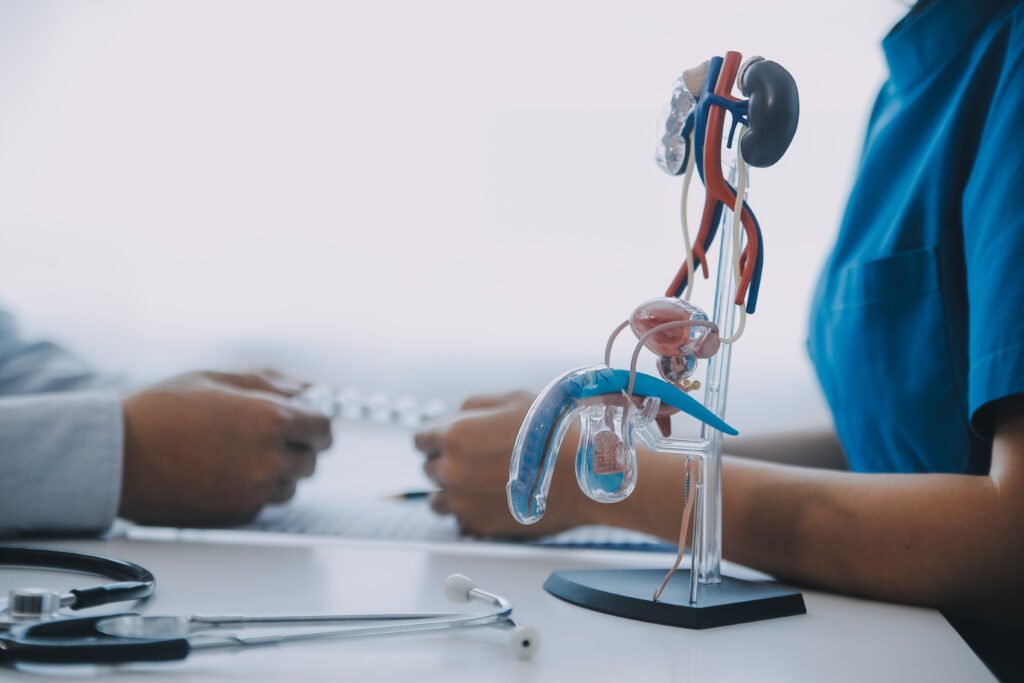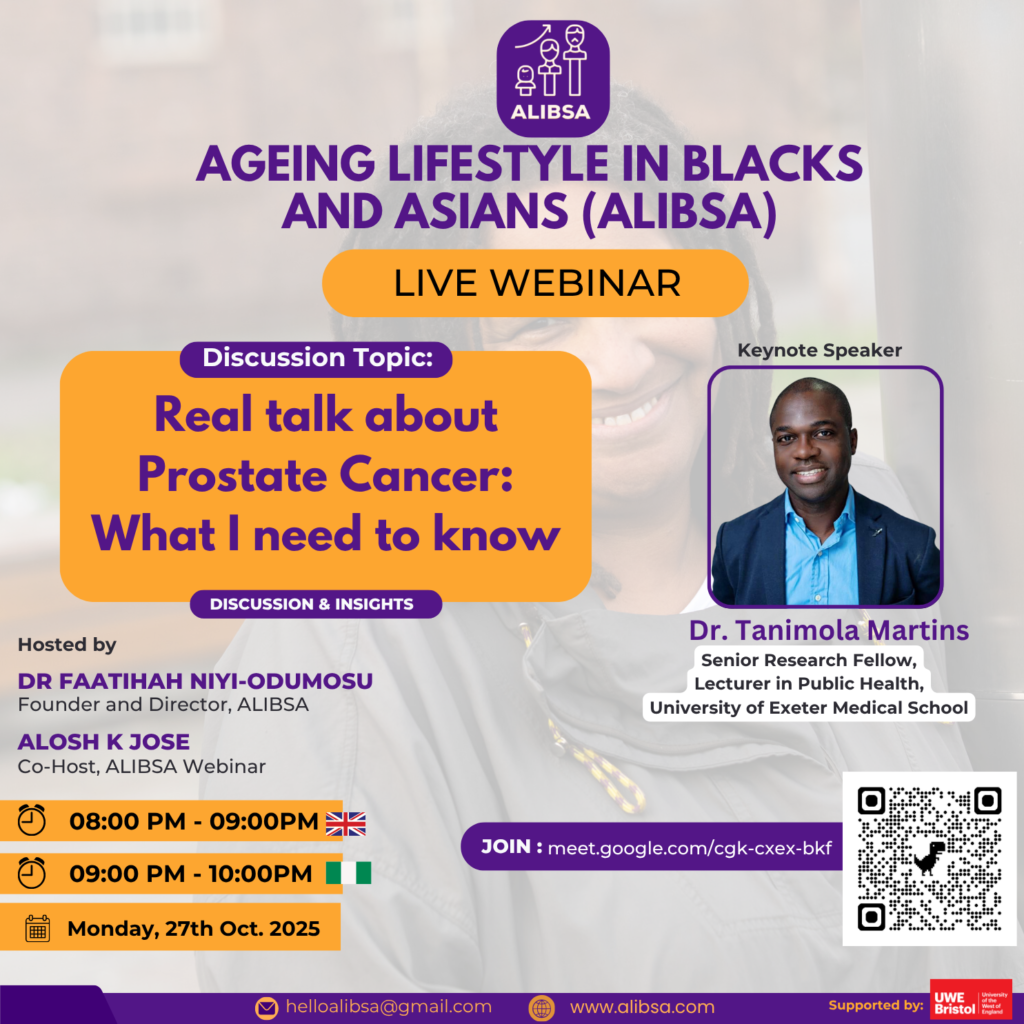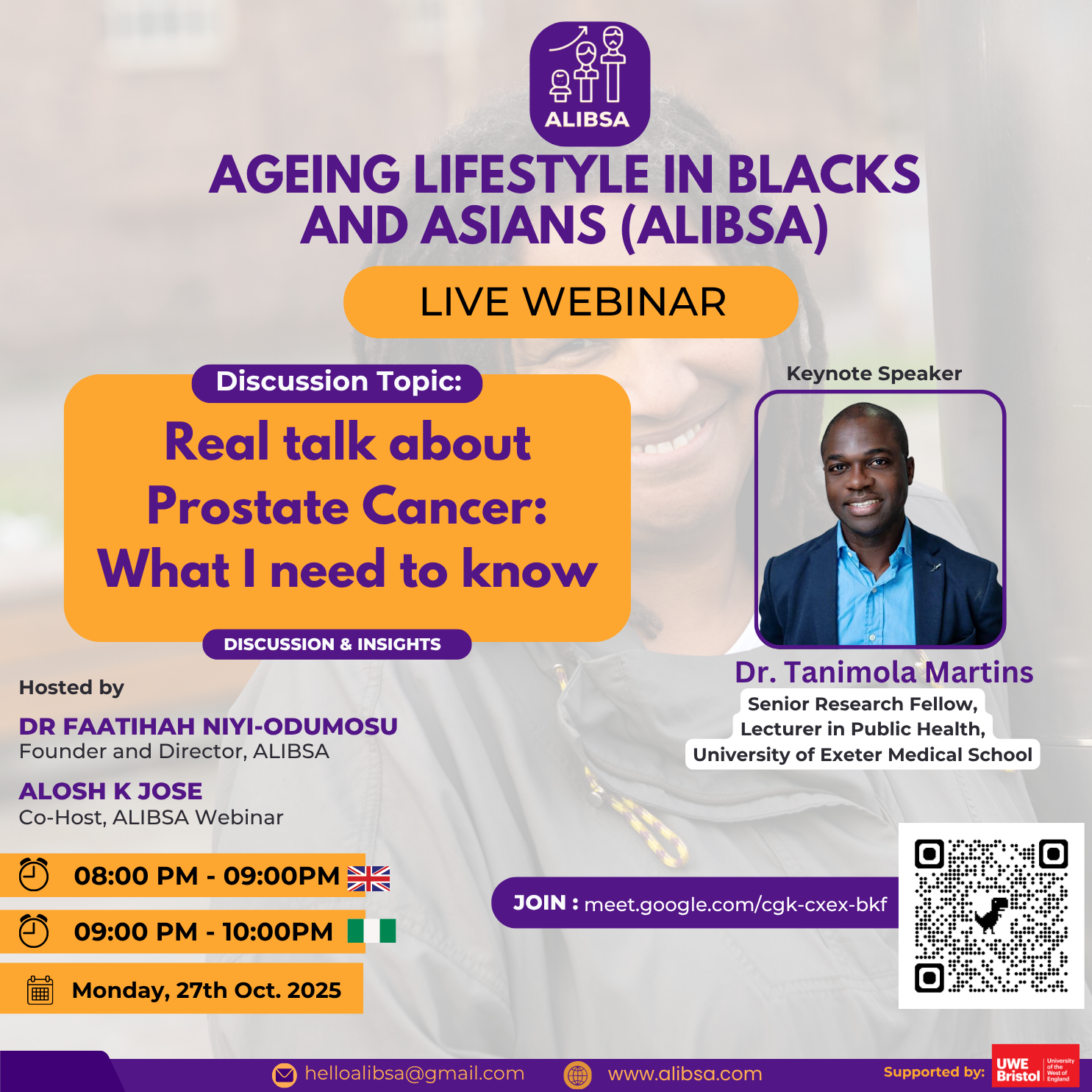Date: October 2025
Introduction
In a deeply informative and engaging edition of ALIBSA webinar, Dr. Tanimola Martins, researcher and lecturer at the University of Exeter, discussed crucial insights about prostate cancer, early diagnosis, and health inequalities that affect men — particularly Black men.
Dr. Martins emphasized that knowledge, early action, and regular screening can make a life-saving difference for men worldwide.
What Is the Prostate Gland and Why It Matters
The prostate gland is a small, walnut-sized organ located just below the bladder. Its main role is to produce and nourish sperm. However, as men age, the prostate naturally enlarges — sometimes leading to benign prostatic hyperplasia (BPH) or, in some cases, prostate cancer.
Prostate cancer develops when abnormal cells in the gland grow uncontrollably and may spread to other parts of the body if not detected early.
Global Overview: Prostate Cancer Statistics
According to Dr. Martins:
- More than 1.5 million new prostate cancer cases are diagnosed globally each year.
- 50,000 men are diagnosed annually in the UK, and over 300,000 in the US.
- In Nigeria, about 18,000 cases are recorded annually — but the real number may be higher due to underreporting.
Despite lower incidence rates in Africa, mortality rates are higher, mainly due to late detection, poor access to healthcare, and limited treatment options.

Who Is at Risk of Prostate Cancer?
Dr. Martins identified several key risk factors:
- Age: Men over 50 face higher risk.
- Ethnicity: Black men are more likely to develop prostate cancer and at a younger age.
- Family history: Having relatives with prostate, breast, or ovarian cancer increases risk.
- Genetic factors: Mutations in the BRCA1 or BRCA2 genes are linked to higher risk.
Common Prostate Cancer Symptoms
In its early stages, prostate cancer often shows no symptoms. As the disease progresses, men may experience:
- Difficulty urinating or weak urine flow
- Frequent urination (especially at night)
- Pain or burning during urination
- Blood in urine or semen
- Lower back pain or unexplained fatigue
- Sudden, unintentional weight loss
⚠️ Note: These symptoms can also be caused by other conditions such as urinary tract infections or benign prostate enlargement.
Diagnosis and Screening
In the UK, most men first visit their GP (General Practitioner), who may:
- Review their medical and family history
- Conduct a Prostate-Specific Antigen (PSA) blood test
- Perform a Digital Rectal Examination (DRE) if needed
- Refer to hospital specialists for MRI scans or biopsies
MRI technology now helps identify suspicious areas before biopsy, improving diagnostic accuracy.
Treatment Options and Living with Prostate Cancer
Treatment depends on the stage and type of cancer. Options may include:
- Active surveillance (for slow-growing cancer)
- Surgery
- Radiotherapy
- Hormone therapy
Possible side effects: urinary incontinence, erectile dysfunction, fatigue, and mood swings.
Despite these challenges, many men live long and fulfilling lives post-treatment — often finding renewed purpose and inspiration.
The Screening Debate
Dr. Martins discussed the global debate on prostate cancer screening. While some experts support routine population-wide testing, others warn of overdiagnosis and unnecessary treatment for slow-growing cancers.
However, he suggested that screening may still hold great value in low-income countries like Nigeria, where most men present at late stages.
Dr. Martins’ Key Health Advice for Men
- Know your body — Don’t ignore changes or symptoms.
- Understand your risk — Especially if you’re over 50 or have a family history of cancer.
- Ask for a PSA test — Record the results to track changes over time.
- Adopt healthy habits — Eat balanced meals, exercise regularly, and limit alcohol.
- Make informed decisions — Research treatment options and seek second opinions.
“Know your body. Pay attention to changes. Ask questions. Be proactive about your health.” — Dr. Tanimola Martins
Final Thoughts
Prostate cancer remains a leading health challenge for men, but early detection saves lives.
Dr. Martins’ session was a powerful reminder that awareness, education, and proactive healthcare can change the narrative — especially for Black men, who face the greatest risks.
If you’re a man over 50 (or younger with a family history of cancer), speak with your doctor today about prostate screening and preventive care.
Further Reading
- NHS – Prostate Cancer Overview
- Prostate Cancer UK – Get Tested
- World Health Organization – Cancer Facts


